Hungary’s transit zones are prisons where pregnant women are handcuffed and children go hungry
További Belföld cikkek
-
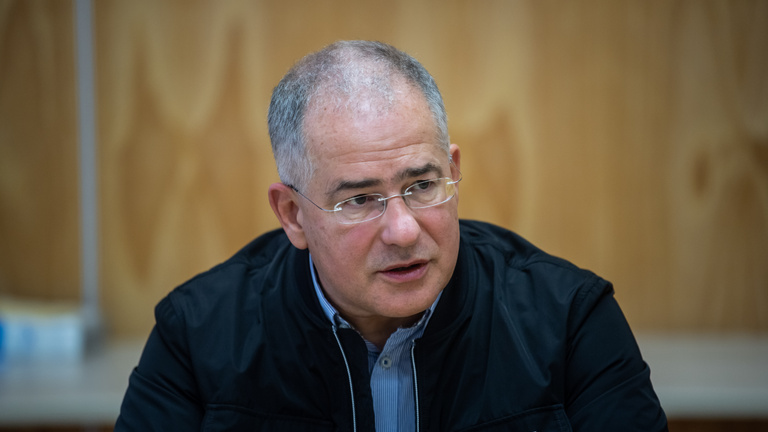 Kósa Lajos Magyar Péternek: Vegyen inkább egy csokor virágot Varga Juditnak
Kósa Lajos Magyar Péternek: Vegyen inkább egy csokor virágot Varga Juditnak - Kiakadtak a pesti Wolt-futárok, amikor elolvasták, mi történik náluk
- A DK egyáltalán nem kér Magyar Péter fideszes együttműködéséből
- „Ha így folytatják, nemcsak takarító, hanem igazgató sem lesz az iskolában”
- Magyar utasok ragadtak Barcelonában a rendkívüli időjárás miatt
- The Hungarian government set up transit zones along the border as a place for those fleeing war to request international protection.
- These transit zones operate as though they are located in a “no man's land”. In other words, Hungarian law does not necessarily apply at these locations. Until now, we had no knowledge of what happens behind the gates of these transit zones because the public access to these areas is restricted.
- We found two families in Serbia who fled the Hungarian transit zones. The respective heads of these families, Labib (L) and Mohamed (M) spoke to us of humiliating treatment, prison-like conditions, and starving children.
- Tímea Kovács, an attorney with the Hungarian Helsinki Committee, met with asylum-seekers in one of the containers at a transit zone. Kovács spoke to us about handcuffed pregnant women. United Nations High Commissioner for Refugees workers are allowed access to the transit zones. UNHCR press officer Ernő Simon helped us reconstruct what is happening behind the barbed-wire fence.
Prison conditions
Labib: There were five sectors at the Tompa transit zone. You could not travel from one sector to the other because a four-meter-high barbed-wire fence enclosed each sector and there were cameras in every corner. We had a small, ten-by-ten area where we sat all day.
Mohamed: There were two families in one container. Seventy to eighty people in one sector, of which about twenty were children, with one pregnant woman and a woman suffering from cancer. The police never talked to us. All the officials were women. They spoke harshly to us. If I asked them for a diaper, they just yelled “no” back at me. There was only one normal person there, a blonde lady, who treated us as human beings. She would greet us, smile at the children, and ask us them how they were doing. The children had one swing, and they would argue [over who gets to sit on it] all day long. Adults would sit in a small area in between the containers, looking at the barbed-wire or the sky. We would cry inside so the children would not see.
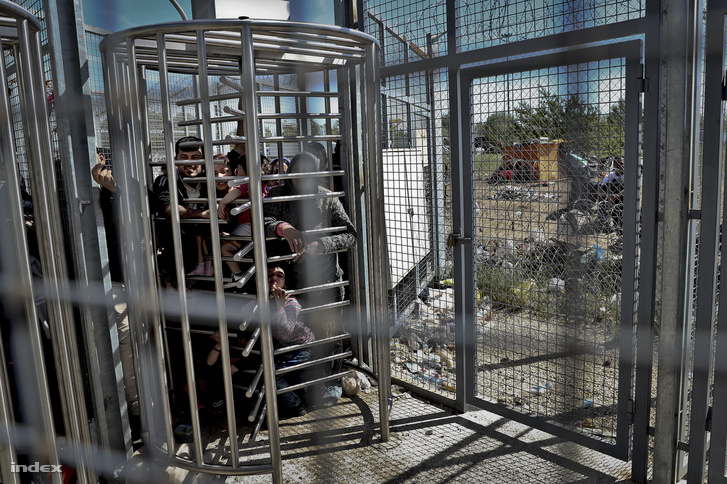
Labib: Upon arriving [at the transit zone], everyone was happy. But after a few days, everyone felt like a criminal. The conditions broke us. We were not allowed to go anywhere. The guards and police did not concern themselves with us. My 11-year-old son was kidnapped when we lived in Iraq, he was seriously traumatized, but no one concerned themselves with him. They didn't have a kind word to say to him. My wife was sick but they did not care.
Ernő Simon – UNHCR: There are four sectors, each sector is bordered by a high, barbed-wire fence. The containers are placed in a manner to prevent people from moving from one sector to the other. The containers used by [the authorities] are air-conditioned, but there is no air-conditioner in the containers where the asylum-seekers are kept. The containers heat up as the day grows hot. The open areas of each sector are practically prison yards for the condemned. The white gravel makes it very dusty. There is no shade. This is no place to keep humans.
Tímea Kovács – Hungarian Helsinki Committee: The people kept in the transit zones feel as though they live in a prison, not a camp. A mother's story about what her child asked her is very telling: “What have you done, mother, to deserve being locked in a prison?” The gates, armed guards, police with rubber batons, and restricted movement only reinforce the feeling that this is prison. The situation grows worse in that no one knows just how long they will be locked up.
Malnourishment, starving children
Mohamed: It was problematic that we were only offered four spoons of baby food per day. It didn't matter that we asked for more, they wouldn't give it to us. If a hungry child cried at night, we had to notify the police, who then notified an employee there who then looked through paperwork for the child's name. It was a long process. The child would constantly cry. At the end of this process, the child would receive two spoons of food, and they told us that we would not be able to ask for food until noon the following day.
We were given two diapers a day, and there was no bottled water. We had to mix the baby food with tap water. We would have heated the water but that was forbidden.
Labib: The feeding was very monotonous. There was no fruit, no vegetables. For breakfast, we received canned food and bread. For lunch, noodles and chicken. For dinner, canned food and bread. Poor medical attention and pregnant women in handcuffs.
Mohamed: Our two-month-old son became sick in the transit zone. The doctor was less than ten meters away from our zone, separated from us by a big fence. With my child in my hands, they escorted me — two police in front and two behind. Two police came into the doctor's room with us. I felt as though my child and I are criminals.
Labib: If you had to visit the doctor, you were escorted by five police officers. On your way to the doctor, you could see people locked in cages, but you were not allowed to speak to them. You could see police and fences everywhere. This was psychological warfare. The doctor really only provided first aid. They just gave you a pill and that was that.
Tímea Kovács – Hungarian Helsinki Committee: The situation for pregnant women is especially hard because there is no assistance for them. They do not even receive vitamins, nor are they fed vegetables or fruits. And it's especially hot inside the containers.
Last month, there was a woman who was escorted to the doctor in handcuffs. Because her stomach was large, they did not handcuff her from behind, but from the front. We haven't seen instances like these in the past few weeks. But there was one mother who should have been taken to the hospital. Because she insisted that her child not see her in handcuffs, she declined to go to the doctor.
Ernő Simon – UNHCR: The sick are escorted to the doctor by police. There was one individual that was escorted 25-30 meters to the doctor by five armed guards. If someone must be taken to the hospital, they are handcuffed and escorted by police. All this despite not being guilty of anything. They came to Hungary to receive asylum.
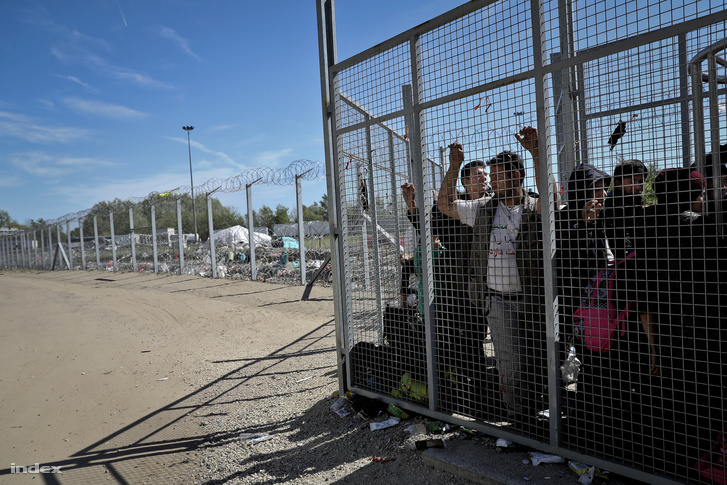
Psychological warfare
Labib: After arriving, everyone is immediately taken to be interrogated. This took our family about 9-10 hours. We were interrogated one at a time, and were locked in a container for an entire day. When we needed to use the restroom, we were escorted by police as though we were criminals. The purpose of these interrogations was to break us. They tried to upset us. They asked us religiously-sensitive questions — for instance, whether I would be open to changing my religion. I told the interrogator that I would switch to the Christian faith if she converted to the Muslim faith. She laughed, then continued asking questions.
Mohamed: My wife and I were each interrogated for four hours. They tried to corner us into answering questions in a certain way, and asked us questions for which we did not know the answers. For instance, why is there an eagle in the Iraqi parliament? I don't know this because I am Kurdish and lived in the Autonomous Kurdish Region. I have never been to Baghdad. We didn't even learn about Iraqi things in school.
Labib: The questions presupposed that we are in Hungary because of money. For instance, why didn't we just stay in Iraq and live off the money we spent on our journey here. It didn't matter that I was once a successful businessman and that we left because my 11-year-old child was taken by kidnappers for ransom. The kidnappers gave my child back when I paid them 50,000 dollars. Later they kidnapped me and shot me, and only let me go after I gave them 70,000 dollars. It was then that we sold everything we had and fled. It did not matter [to the interrogator] that I said I would never recoup the money it cost to flee [Iraq] even after working for five years, or that we fled not because of money but because of terror.
Mohamed: We did not receive water or food during the four-hour interrogation. And there was no restroom. By the end of it, I almost wet myself. That is when I told them that I must go outside. Two police escorted me to the restroom and stood next to me as I relieved myself. The interrogator asked me things like, “Say five negative things about Serbia.” This is where I had to say bad things about Serbia because if I would have said anything nice, they would have sent me back. I told them that Serbia does not care for human rights, they mistreated us, and they did not care for us adequately — but this is more true for Hungary.
Tímea Kovács – Hungarian Helsinki Committee: For families, these interviews take a long time and they are not offered any food or drink, nor do they know that they can use the restroom if they need to. They are not informed that they can request that an attorney be present, so they never have that opportunity. We also found out that the Hungarian authorities give no consideration to documents presented by these people, copies of such documents, threatening letters, or any documents clarifying their situation.
Retreat to Serbia
Mohamed: My child was very sick — choking. I took my child to the doctor every day but it didn't matter that I said the medication wasn't helping, we were only offered one spray and nothing else. By the end, the situation was so bad we were afraid our child would die. Our child could not keep milk down and vomited, nothing would stay in the stomach. We asked the Hungarian authorities to deport us back to Kurdistan. They said they would but first they would take us to Budapest, lock me in jail, separate me from my wife and child — who they would lock up somewhere else. We would not be able to see each other and only after that they would decide when and how we would be deported. They intimidated us. That is why we decided to come back to Serbia. Our child received medical care here and became better. We are given an entire box of baby food and even five diapers per day if we need it.
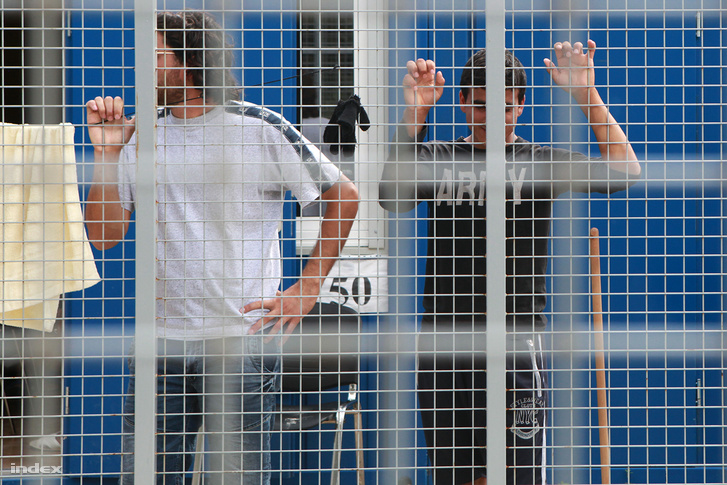
Labib: We were there for fifteen days. My wife was sick and it didn't matter that I told them she needs to be taken to the doctor because she needs an operation. I wrote a letter to the [managers of the transit zone] telling them that this is a prison, not a camp, and that we would go back to Serbia if they did not take my wife to the hospital. Half an hour later, a supervisor arrived accompanied by two police officers. They gave me a plastic bag, told us to gather our belongings and to head back to Serbia. We told them that it is nighttime and asked whether we could just leave in the morning so that we could have a place to sleep. They told us to leave immediately. My family – myself, my four children and my sick wife – were put out on the border at night. I asked for them to give us a document showing that we asked to go back [to Serbia] on our own will. They told us we would get nothing. I asked for an attorney but they didn't care.
Here in Serbia, I asked them to deport us. My wife would have been operated on in Serbia, but we waited to gain entry into Hungary because we thought that Europe would be better. I now have a different opinion of Europe. Disappointing. If we die, we might as well die at home.
The UN says all of this is unlawful
“Not only are transit zones in critical condition but the entire system has problems,” the UNHCR's top representative tells Index.
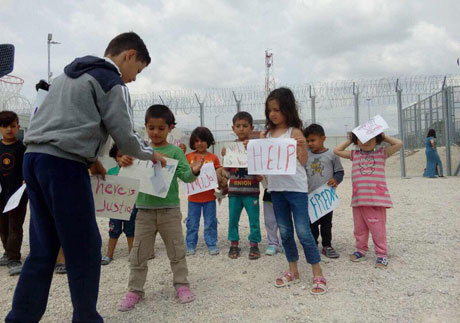
“It's absurd and unacceptable that children and adults have their freedom of movement restricted and are locked behind bars by Hungarian authorities. This is especially a problem for the children, who should never be locked behind bars. On top of all this, we just don't know how long children and adults are being locked up. The asylum procedures can last months, even up to a year,” says Ernő Simon.
“These children and adults did not commit crimes. They exercised a fundamental right that is guaranteed by international treaties: they have asked for asylum. What's more, these people are not climbing over fences, they have done what the Hungarian authorities have asked of them and registered at the transit zones. Nothing justifies their detainment, except that they officially submitted their asylum request in Hungary. Hungarian authorities are punishing those who choose to exercise their right to asylum.”
The Office of Immigration and Nationality says none of this is true
We asked the immigration authority why they keep innocent people in prison-like conditions, why they handcuff pregnant women, and why the provide poor care. They told us that there is no truth to what our sources – asylum-seekers independent of one another, the lawyer, and the UNHCR – have said. Our questions and the immigration authority's unabridged responses are the following.1. Parents with small children have said that they receive limited amounts of food, and that if a crying child asks for more, then they will receive less the following day. Why do the children not receive enough food?
This statement is simply not true. There are no limits to the amount of food for toddlers. The baby food is prescribed by a pediatrician and the food is ensured for babies and toddlers. Baby food and fruit sauce is provided in unlimited quantities for children aged four to six-months-old, respectively.
2. We were informed of two pregnant women that were taken to the hospital in handcuffs when they needed medical attention. Why was it necessary to handcuff these pregnant women?
Without knowing the dates of the transport of these women, we must refute these statements. Documents in our possession show that six expecting women were placed in the transit zones, and none of them were transported to a health-care facility in handcuffs.
3. Why is it necessary to handcuff those asylum-seekers who depart the transit zone to visit the doctor or for other reasons?
It is not necessary, and is only done in certain rare instances when justified under the law, for example when the person poses a risk to themselves or others.
4. Which law lays out the circumstances under which it is justified to handcuff someone when that person is not being charged with any crime?
The curtailing of personal freedoms is established by the 1994 CCCIV law on law enforcement. (Index writes this is not justification).
5. Asylum-seekers are afforded limited movement, having only a 10x10m yard without shade if they choose to move around. Do you plan on changing this?
6. Does [the immigration] authority not consider the restriction of movement to be inhumane treatment?
A solution to provide shade is under way. The opportunity to move around is not restricted for any asylum-seekers. What's more, on April 6, 2017, you could have personally seen that asylum-seekers had access to sporting equipment.
7. An individual we interviewed states that his wife – who needed hospital care – was only allowed to visit the camp's doctor despite having documentation that indicated she may need surgery. Who decides whether someone is in need of a specialist physician?
The doctor decides whether a specialist physician is needed in every case.
8. An individual we interviewed claims to have written a letter pointing out the lack of adequate medical care and stating that [they] would leave the camp and return to Serbia if they do not receive care from a doctor. Half an hour after submitting the letter, they were removed from the transit zone at night — a family with four children. They asked to be allowed to stay until the morning, but were not afforded the opportunity. Why were these asylum-seekers and families needing medical attention treated so strictly?
The authorities do not force anyone to leave the transit zone. The asylum-seekers leave the transit zone for Serbia when they so choose.
9. Does [the immigration authority] plan to improve conditions at the transit zones? If so, what kind of changes can be expected?
10. If there will not be any changes, is that because [the immigration authority] is satisfied with the conditions?
When designing the transit zone, we paid special attention to the divided sectors (separating single men from single women, and unaccompanied minors over the age of 14 and families) to make conditions as comfortable as possible. All sectors have ecumenical prayer rooms, wifi is provided, as is the ability to watch television with several Arab-language stations. Sports equipment is provided, and the family sectors have playrooms. Social workers from the the Immigration and Refugee Affairs Agency organize activities for the children during the day (drawing, painting, etc.).
11. Is it true that asylum-seekers lose their right to submit asylum claims in Hungary if they return to Serbia?
It is not true. According to the regulations, the applicant who chooses to leave the country is not restricted from applying for asylum in Hungary again.
A Kurdish news agency even reported on the inhumane conditions
At the end of May, several asylum-seekers began to protest the poor conditions at the camp. They asked their children to hold up signs calling attention to the prison-like conditions. The protest made it all the way to Iraqi Kurdistan, where local papers reported on the Hungarian situation.
The Hungarian Consulate responded to the article, refuting the claims of the asylum-seekers and the UN. According to Csaba Vezekényi, the conditions at the transit zone are ideal, there are sports, and the children can spend the entire day on a playground.
Vezekényi also said that the transit zone was built for those who illegally enter Hungary. He misled the foreign newspaper's reporter because the transit zones are used by the Hungarian state to treat cruelly all those who – acting in good faith – legally sought entry into Hungary after waiting in Serbia for months.
.

